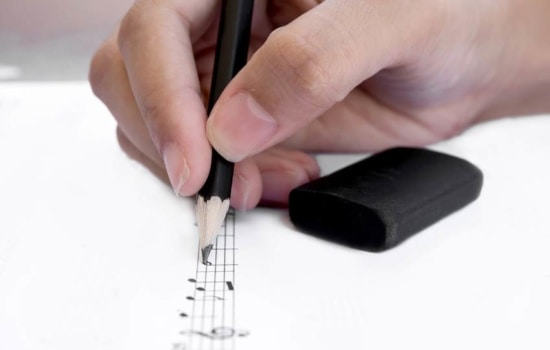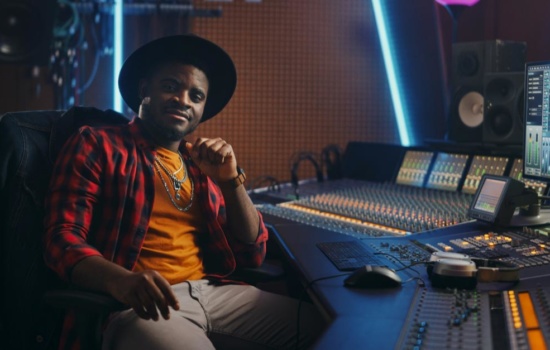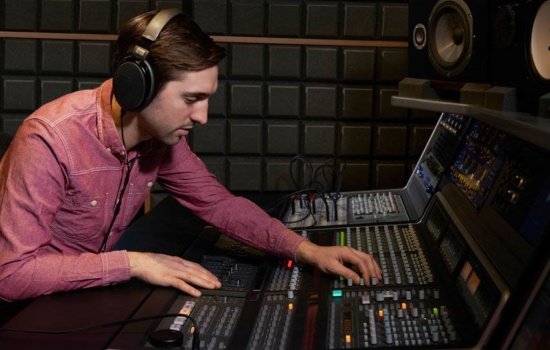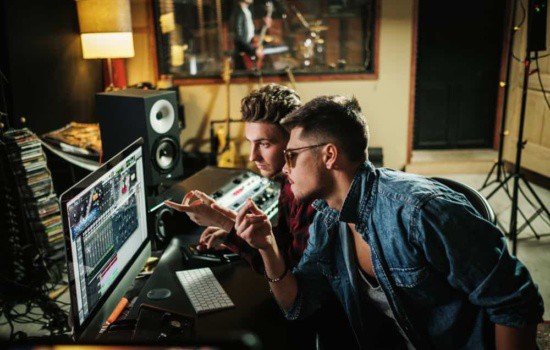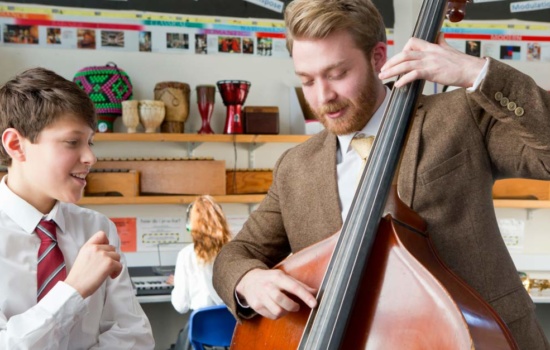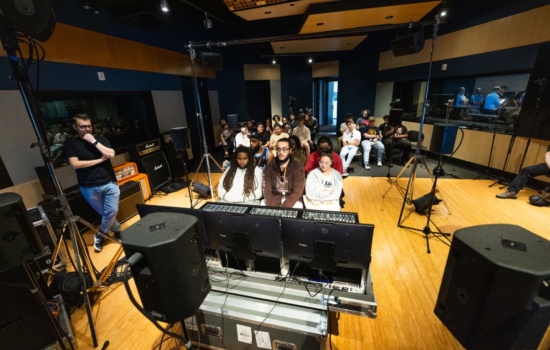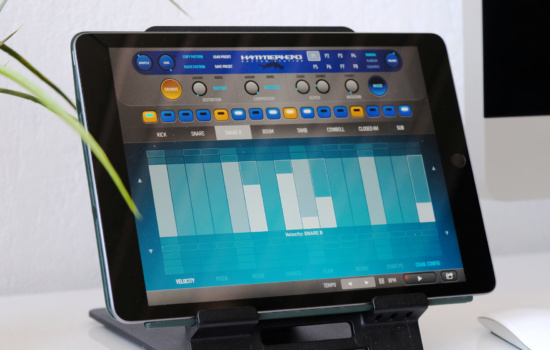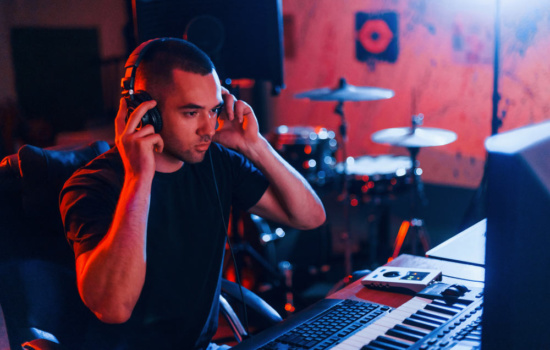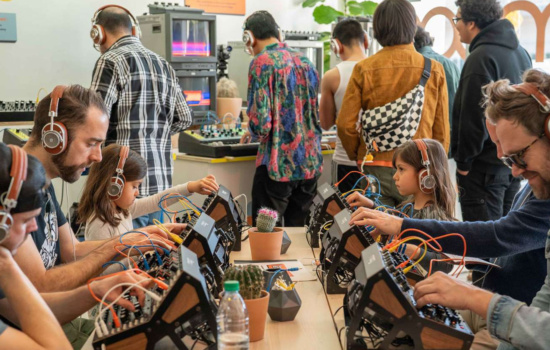Many of the greatest Rappers make their art form look easy, but learning how to rap is difficult, time-intensive and it involves many more steps than most people might realize.
Everyone takes their own journey when it comes to diving into the hip-hop space, but I have compiled a list of what you will need to do to begin rapping, and below I’ve placed them in an order that will hopefully make sense for most young people picking up a pen and microphone for the first time.
Feel free to go at your own pace and perhaps even mix up the order, but know that you will need to check all of these off at some point if you want to be able to say you know how to rap.
Take these steps to learn how to rap:
- Listen to rap
- Study the genre’s history
- Learn how to emulate
- Choose a topic
- Select a song structure
- Look up rhymes
- Dissect rhythms
- Try a chorus
- Write every day
- Decide how you’ll get your beats
- Practice, practice, practice
- Seek out feedback
- Share your art with the world
- Begin freestyling
- Look into performing live
If you’re even thinking of learning how to rap, you are certainly a fan of the style of music, no questions about that…but are you listening to enough of it? If you’re hitting replay on your favorite few musicians and sticking to the biggest hits, you’re not only missing out on some great art, you’re doing yourself a disservice as an up-and-coming talent.
When I say listen to rap song, I am suggesting you make a concerted effort to discover new artists, play lesser-known acts with critical acclaim, and spend quite a bit of time exploring all the different subgenres. In the decades it’s existed, rap and hip-hop have been taken in so many different directions, and you should want to hear them all. Look up lists of the best Rappers and head to their pages on Spotify, Apple Music, or even on YouTube and start enjoying!
As you’re streaming songs, albums, and mixtapes by everyone from the most successful hip-hop musicians of all time to those who helped introduce the genre to the masses, do your homework as well. In addition to simply listening to what’s out there, you will want to do quite a bit of research.
There are countless articles, books, documentaries, and podcasts that detail the start of hip-hop, the rise of rap as a hit-making style of music, and on the record labels, studios, companies, and certainly the people (both musicians and those in the industry) who are responsible for rap being where it is today.
If you’re interested in not just making a few tunes as a hobby but spending your life creating this art, it will really pay off for you to know your history and to have references to pull out both in conversations and in your work.
Knowing and deeply understanding the history of rap will help you learn from other artists, while also informing you on what’s out there and where it came from.
Yes, I did just mention not copying other musicians…but at the very beginning, doing exactly that can be extremely helpful. Think of it this way: if you were going to pick up a guitar or sit down at a piano to learn those instruments, you wouldn’t begin by composing your own works.
You’d play simple chords and then progress to well-known songs by Composers, Singers and bands. That’s how people learn, and you can do the exact same thing when it comes to rapping.
Choose a song you love from one of your favorite musicians and tape yourself rapping their words over and over. Listen to what you’ve done and dissect what works, what doesn’t, and where you succeeded in sounding like them. It will take some time, and it can be far more difficult than you initially imagined, but eventually, you will end up with a recording that sounds very similar to what you adore.
Once you’ve reached that point, you may have a better sense of what it feels like in your mouth saying those words, finding space for breath, and performing at the rapid pace some stars have chosen.
Repeat this process over and over with many different types of rap songs and enjoy doing so before you start rapping your own lyrics.
Can you learn to rap or is it natural?
Both! Some people are born with an innate ability to rap, while others learn how to do so. That means that anyone can rap, though some need to put in more time and work a bit harder than others.
Just like other creative pursuits, such as singing, acting, dancing and more, there are those who seem like they were made to do nothing else. They pick up the habit at a young age and never stop. Some Rappers have been able to rise to the top of the charts at a very young age with what appear to be God-given talents. That’s great for them, but even those who have been blessed often have to work incredibly hard to perfect what they do and survive in a very competitive and difficult business.
On the other hand, rapping is a skill that can be learned. Those who know nothing about it or who seem to have no internal rhythm or flow can still practice enough to become good, though unlike their more gifted counterparts, they have a much more difficult journey ahead of them. But don’t fret! Rapping can be picked up no matter at what point someone is beginning.
Can you teach yourself to rap?
Alison Stolpa (CareersInMusic)
You can definitely teach yourself to rap. Most famous Rappers started out by listening to legendary rap artists and learning from how they wrote lyrics and developed a flow. To get started, listen to your favorite Rappers and find your favorite elements of their songs. Figure out what they’re doing and why it works.
Next, start writing. Keep honing those skills. Write rap after rap. Next, perform those raps. You can start out by just rapping at home by yourself, then ask trusted people in your circle, next take it out into the world and get constructive feedback. Don’t listen to the haters–what people like is so subjective. But if people have feedback that actually helps you grow, build that into your practice and keep going.
Okay, so you’ve spent weeks (or months, or even years) reading, listening, and mimicking, so now you’re in a good spot to put pen to paper to write your first rap song!
First thing’s first: what do you want your song to be about? You can rap about just getting started, your home life, aspirations for the future, the state of the world, partying with your friends…the list is endless, but there is a good place to kick off. If you’re only beginning your career as a Songwriter, stick with what you know.
Don’t try to rap about having millions of dollars and topping the charts if those things aren’t true. That may work if you’re on the way up, but nobody is going to buy it if you really can’t back any of it up.
Also, don’t worry if you have a lot you want to say, as this is just your first go.
How can you start your own rap?
As it is with almost any creative endeavor, there is no definitive way to start a rap, but there are a few suggestions that newcomers, and even those with experience who may be having a difficult time with a particular track, can use to begin.
First, choose a beat. Then, listen to it many times in a row. Step away and come back to it. Think on the tune. Let a melody, and then some words, come to you. See what happens when you don’t force anything, but rather let your subconscious run wild.
As you work on any song, you will have to spend hours writing rhymes, looking up words, editing the lyrics, rearranging things, trying out different cadences and then practicing the song over and over and over before it’s ready to record, but those aren’t really the first steps. In the beginning, it’s all about feeling the track and letting your creativity go to really interesting and even unexpected places. Don’t worry about getting anything right immediately because remember – genius takes time.
You have a topic, but do you have a sense of what structure your song will take? Actually, some beginners may not even know what that means at this point. If you have been listening to as much music as you should have by now, you will likely have an intuitive sense of song structure, just as you have an idea when surprises will come in movies or when a story is approaching its close in a book.
Once you consume enough media, those types of things will come naturally…but that doesn’t mean you shouldn’t do your research once again.
Look up song structures and study what they mean and what goes into all the various types of tracks. You may choose a very simple one, look for a lesser-used option, or perhaps you’ll blend ideas and go for something really weird. I would personally suggest sticking with a beginner’s structure, but it’s entirely up to your creativity and what you decide you want to go with.
Now this is where some of the genius in rap comes in. Start writing the lyrics of your song, at first making sure you get some great ideas and excellent lines on the paper. From there, you can start placing them, deciding what goes first, last, and so on. But it’s not enough to simply pen some neat lines, you need to make sure they rhyme, and that can be very tricky.
As you write, it’s perfectly fine to use a rhyming dictionary to make everything work, as even some of the biggest names in the music industry rely on those (and not just in rap). In addition to substituting one word for another, as it rhymes with something else, you’ll need to think up new ways to share the same sentiment, all for the sake of the rhyme. You may add things, take some away, rearrange sentences, and so on. This is songwriting!
Once you have the words, you need to figure out how you want to rap them. That might be a strange sentence to read, as many newcomers don’t understand that rhythm plays a huge role in making a song great and separating one musician from another, especially in the hip-hop and rap fields.
Try taking one verse from a song you listen to on repeat and think about how each word is spoken. Is a certain syllable stretched out? Does the musician emphasize one word or try to diminish others? Is it fast or slow, or maybe both at different times? Dissecting what others have done will give you a sense of what’s possible and may even inspire the track you’re working on.
Rhythm is everything in the song, but it often goes unrecognized by audiences. As a musician yourself, you can’t afford not to think long and hard about every word, syllable, rhyme, and how these sounds come out of your mouth.
Many would argue that the chorus is the most important part of any song, no matter the genre. The chorus is the part that repeats, usually three or four times in a track, and it typically features the catchiest hooks. The chorus is the bit you want to make sure sticks in the mind of your listener and that they’re able to repeat it back, singing it over and over.
Many chart-topping hip-hop songs that have become the bestselling and best-performing of all time feature Pop Singers on the chorus, blending the genres to maximize audience reach. This is a space inside the track where it’s not just the words, but how they fit with the music and how they’re sung (or rapped) that matters perhaps even more than the verses.
Choruses are deceptively simple and incredibly difficult to write, but that can make them some of the most fun to work on. This is also where you will decide what kind of tune you want this to be, either pure rap, easygoing hip-hop, or perhaps something else entirely.
Like any other skill you could want to master, such as learning a new language or picking up a new exercise regimen, you’ll want to make time every single day to practice both your songwriting and your rapping. This is something you won’t just do in the beginning of your career, either, as even the biggest and best out there usually work on their craft (and that’s exactly what it is) every single day.
Some days you may write a full song. Other times, you may only perfect a chorus. In still other instances, you may pen a slew of phrases, rhymes, lines, and so on, saving them for later use.
I am not here to tell you exactly what you should produce during this time, and it’s great to go into these sessions ready and willing to let your mind wander and see what comes out of it. There will, of course, be instances when you need to focus on finishing a track or wrapping up one piece or another, but simply brainstorming can be very helpful.
In the beginning, I would suggest you set aside a specific time every day when you know you’ll be able to focus on nothing but writing, and perhaps rapping as well (but let’s stick with writing for the moment). This may be in the morning before you begin your day, which may mean waking up early, or perhaps in the evening during a time when you would normally be watching TV.
Is it easy to rap?
In its simplest form, you could say it’s easy to rap, just as anyone could claim it’s “easy” to sing, act, paint, dance or write a song. The question isn’t really is it easy to rap, but rather, is it easy to rap well? And the answer to that is no.
Even those who seem to be born with the gift of rap (more on that in a minute) need to work hard and learn a lot. Anyone can rap, but few can do so in a way that many people enjoy and are willing to either pay to listen to or constantly engage with, which allows the artist to do what they love for a living.
Rapping is simply writing down words that all make sense together, ensuring they rhyme and fit into a song, and then spitting those lyrics out. Now, whether anyone’s interested in what you have to say or if they like how you say it is a completely different story.
These days, finding beats is easier than it has ever been, and, thankfully, you don’t need a lot of money to get your hands on a track you’ll really want to work on. There are countless websites where up-and-coming Producers sell their wares, and you can usually snag a great, catchy composition for $25 or $50. A simple Google search will show you dozens of companies facilitating these sales, and you may soon be overwhelmed with options and ideas.
There are plenty of musicians who choose to make their own beats, and that is also more available as an option than in the past…though it is much, much harder. If you want to craft your music from scratch, you’ll need a number of computer programs (at least one to start, but eventually several) and a computer that can handle them.
You will also need to learn how they all work, and that can take a long, long time. It is comparable to mastering an instrument, because, well, that’s what it is.
If your focus at the moment is on learning how to rap, I would stick with that. You don’t want to bite off more than you can chew by attempting to master two difficult skills at once, but that’s not to say that beat making can’t be something you pick up later on.
What is a 16 in rap?
Alison Stolpa (CareersInMusic)
The phrase “16 bars” gets tossed around a lot in rap. That’s what “16” refers to in this context: 16 bars (or measures) in a song. Typically, a verse in a rap song will consist of 16 bars and a chorus will consist of 8 bars. With the commonly-used 4/4 time signature, you’ll usually have 4 beats per bar/measure.
You knew this was coming, and here it is. If you want to learn how to rap, the best thing you can do is practice…and keep doing that. You will need to practice over and over and over, and in every way you can imagine. Practice copying other Rappers, practice your own song, and then do it with a completely different rhythm.
They say that practice makes perfect, and while it’s hard to say any piece of art is perfect, the only way to become great is to put in the time and the work.
At some point, you will have a song you really love, one that you’re proud of. Once you do, it’s time to share it, but perhaps not everywhere, not just yet. Let your friends play it and ask them what they think.
If you have any connections in the music industry, ask if they’ll do the same. You want feedback from those who are only casual listeners and those who really know what they’re talking about, as you’ll want both of those types in your audience, so listen carefully to what they say and don’t get discouraged if they have a lot of notes.
Eventually, you’ll have a track you have workshopped, edited, and re-recorded, and you’ll decide it’s done. Don’t come to that decision lightly, but it’s okay to stop writing and working and to share it with the world.
I won’t dive into how to find distribution to platforms like Spotify and Apple Music, reaching out to record labels or building your own career from the ground up, as those could all be separate pieces, but know that it will be scary…and that’s just part of the process!
Some Rappers start with freestyling, but you may want to think about doing so later on. Freestyling is incredibly difficult, and even some of your favorite hip-hop musicians may not have that skill down pat, so don’t feel bad if you don’t pick it up quickly. It’s not necessarily something you will need to do often, but being able to will open up doors, earn you a lot of cred, and you may want to incorporate it into your art.
Again, I could write another full piece on just freestyling, so I’ll simply encourage you to do your research and listen to as many examples as you can…which is sure to be a lot. The more rhymes, flows, and words you have in your head, the better off you’ll be.
Playing shows is perhaps the last thing you’ll want to do, at least as far as this article is concerned. You can’t even ask to perform in front of an audience until you have a collection of songs they’ll want to hear.
Booking concerts is hard, especially as someone just getting started, and it requires other skills and a lot more practice, so keep in mind that if you’re going to go out for live performances, you have a lot of work ahead of you…but boy can it pay off in spades. Many artists say that performing for a crowd is their favorite part of the job.
Why do Rappers fail?
Alison Stolpa (CareersInMusic)
There are so many reasons people don’t succeed as Rappers. Often, Rappers fail because they don’t have the commitment, connections, and desire to constantly improve. It’s your talent, yes, but this is not a solo sport. You need a supportive team you can trust to help you take the next steps in your career AND you must be willing to take the steps to get there. It’s a collaborative effort. Check out what successful Rappers have done to build their careers and model your approach after theirs.




